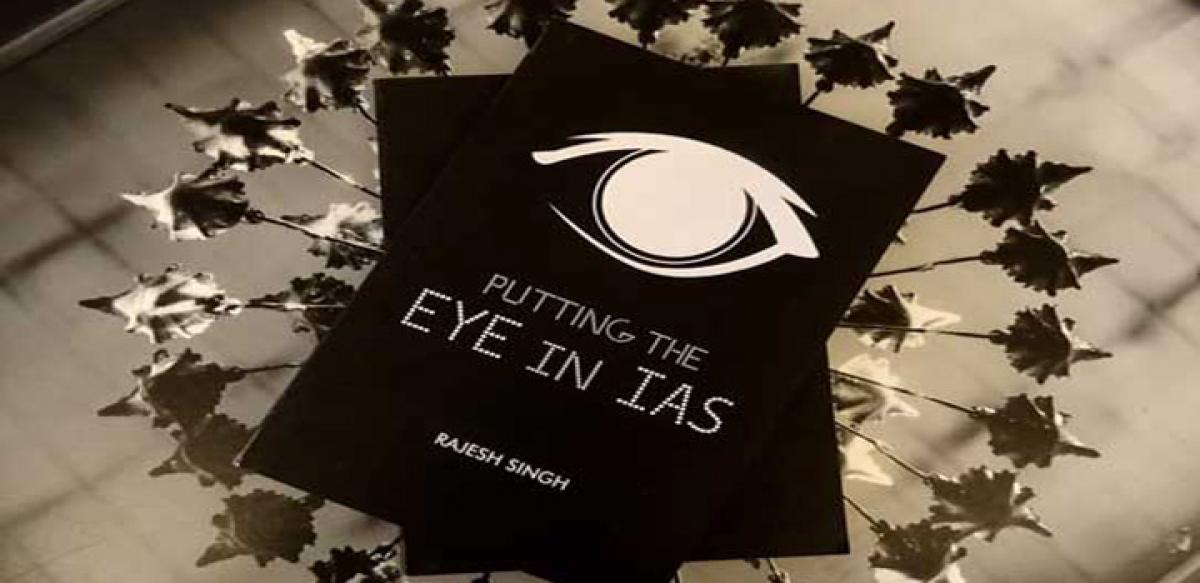Live
- Gurumoorthy appears to be ahead of pack
- CM bus yatra draws huge crowds
- From a doctor to a politician, Thanuja Rani looks forward to serve society
- Hyderabad: ‘Modi govt contributed Rs10 lakh cr for TS development in a decade’
- YSRCP, TDP candidates file nominations
- Hyderabad: Kishan reddy presents report to Secunderabad LS constituents
- Lavu, Chadalavada file nominations
- Vizag to be developed on various fronts: Education Minister
- IIIT Hyd launches new dual degree programme in geospatial technology
- Rangareddy: MLA Veerlapalli Shankar inaugurates dance academy
Just In

Unfolding an inspiring and struggle filled journey of a visually impaired IAS officer, a book \"I: Putting the Eye in IAS\" reflects the author\'s life but is not an autobiography. Having cleared the Civil Services examination in the year 2006, Singh was appointed as an IAS after a long legal battle and intervention of the Supreme Court.
The book is also available in Braille and would be soon published in the e-format so that the readers can have easy access to it
New Delhi: Unfolding an inspiring and struggle filled journey of a visually impaired IAS officer, a book "I: Putting the Eye in IAS" reflects the author's life but is not an autobiography. Having cleared the Civil Services examination in the year 2006, Singh was appointed as an IAS after a long legal battle and intervention of the Supreme Court.
"Initially, it was very difficult to convince the whole system. There was reluctance on the part of the system to induct an IAS officer who is 100 per cent blind. "Finally it was the judgment of the Supreme Court which made it clear that there is difference between eyesight and vision. To become an IAS you need vision and not eyesight," Rajesh Singh, whose book was released here recently.
Launched by Lok Sabha speaker Sumitra Mahajan, the book is a work of fiction based on the journey of a young visually impaired boy from Patna. He fought against tremendous odds and put all his efforts to prepare for Civil Services examination. Speaking at the launch, Sumitra Mahajan said," Creativity, ability and skills of differently abled and other marginalised sections of the society should not be wasted. As a pluralistic society, we must be more sensitive to the specific requirements of different segments."
Serving as the Joint Secretary, Department of Woman and Child Development and Social Security, Jharkhand and Project Director, Integrated Child Protection Scheme, Jharkhand, Singh said that the real challenge was to prepare for the exams after which he had to go through the legal process. "The real challenge comes when you prepare for the exam.
But I was lucky enough to have so many friends around. I had to go through a lot of legal tangles. But it’s not about bad or good people but it is about how people perceive visual impairment and to what extent they take you as an unavoidable asset for this nation," Singh said.
Having graduated from Delhi University and completing his MA from Jawaharlal Nehru University, where he was a Junior Research Fellow, Rajesh feels that JNU is a laboratory for experiment of ideas and ideologies but criticized any kind of anti-national activities.
"JNU has always been a very happening place. It's a laboratory for experiment for so many ideas and ideologies. If some anti-national slogans have been raised here, I criticise it. "But somewhere down the line I would always say that JNU has given me a lot. It has improved my personality, my vision and the kind of equality I have seen at JNU, it is unmatched in the whole country," Singh said.
Born in Patna, Singh has also represented India in three Cricket World Cups for the visually challenged from 1998 to 2006 after losing his eyesight in childhood. He was also nominated for the CNN IBN's Citizen Journalist Award in 2010. But he believes that the book is not his autobiography though it draws heavily from the real life challenges which a visually impaired individual has to face at all levels.
"Somewhere down the line, sometimes unconsciously your individual thinking and mindset also comes in. My position is a better example to write this book. So I borrowed this example from myself to complete the book. But this is a work of fiction," says Rajesh.
Published by Vigilante Publications, the book is also available in Braille and would be soon published in the e-format so that the readers can have easy access to it. Singh aims to take his initiative further by sensitising people and spreading awareness about the visually impaired. He says he wants to do something for the marginalised children along with organising cricket tournaments for the visually impaired people.
"I want to work for the marginalised children. "I am gaining experience which I would use to sensitise people. This book aims to make people aware about visually impaired people and it would be an inspiration," Rajesh said.

© 2024 Hyderabad Media House Limited/The Hans India. All rights reserved. Powered by hocalwire.com







